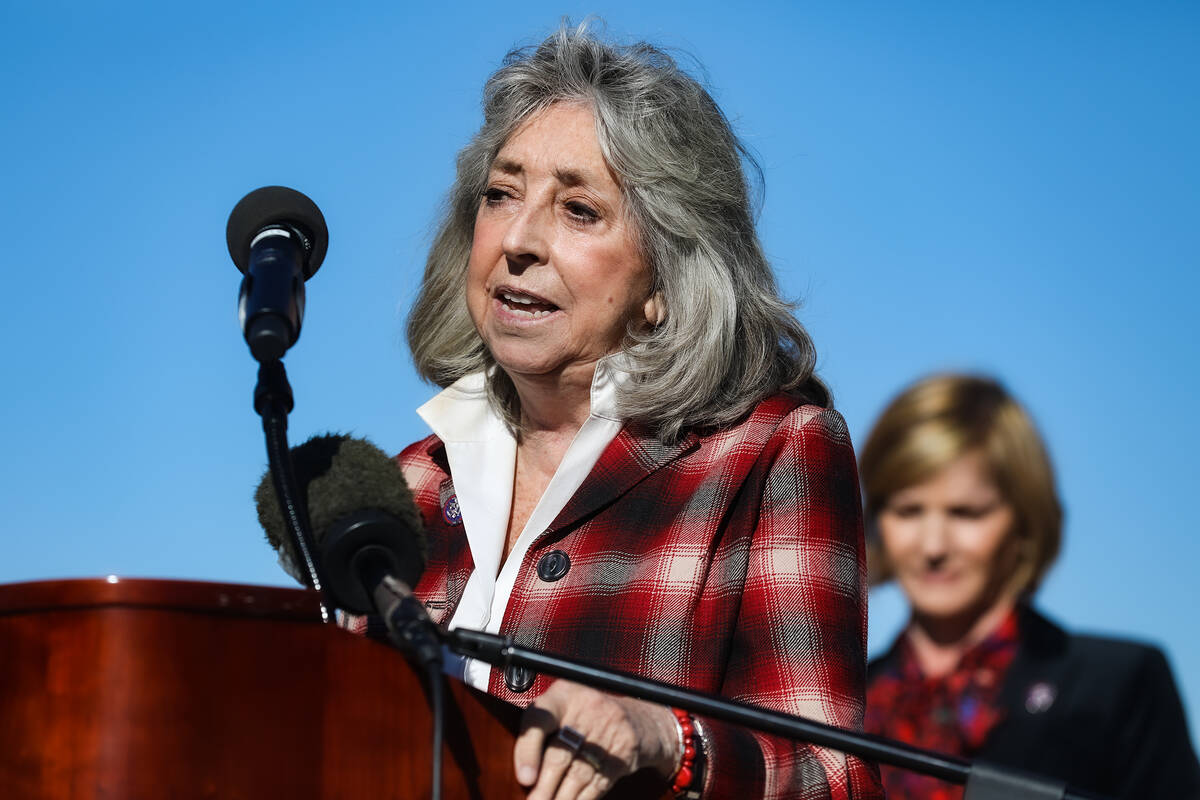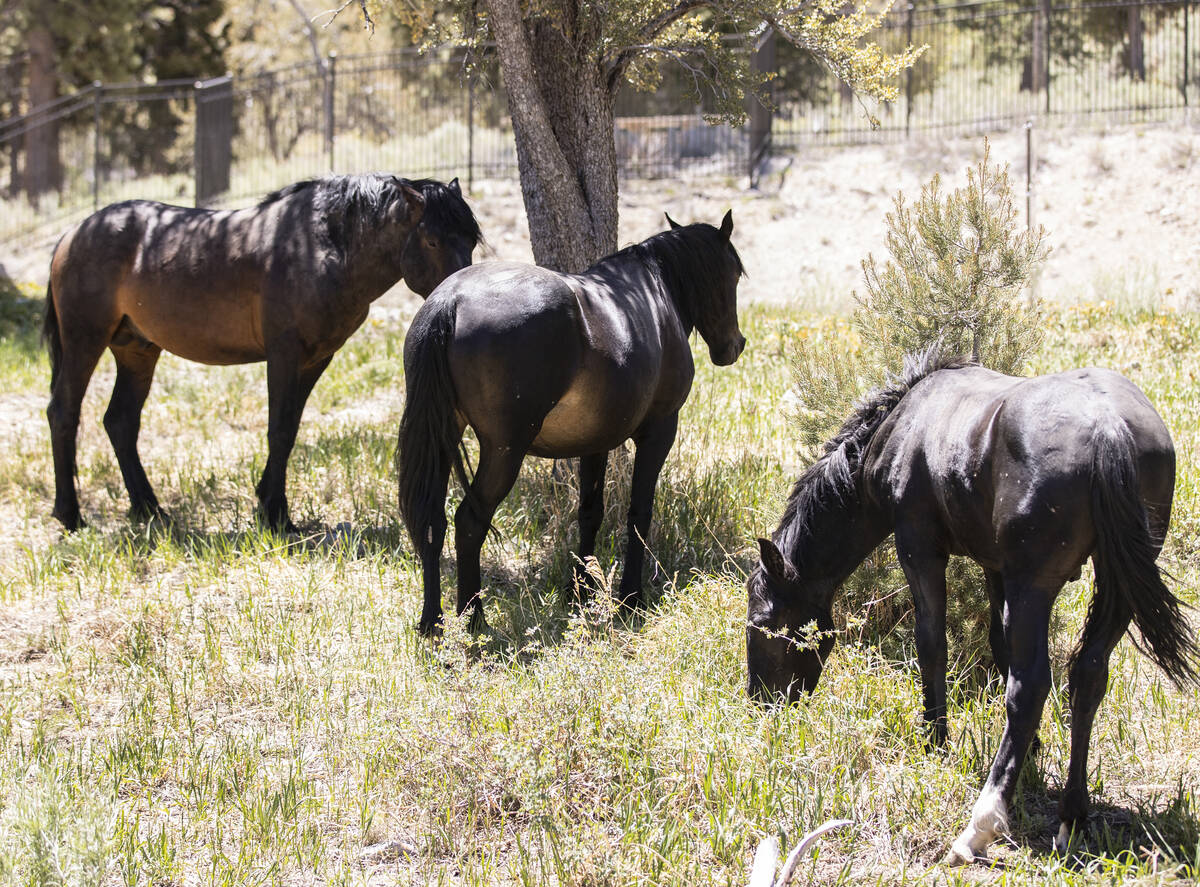Congresswoman Dina Titus demands halt to wild horse roundups
WASHINGTON — As the death toll of wild horses rises at a Bureau of Land Management corral in Colorado, Rep. Dina Titus of Nevada asked Interior Secretary Deb Haaland to stop mustang roundups and investigate conditions at holding centers for mustangs and burros.
Officials with BLM suspect an equine influenza virus is responsible for the deaths at the facility in Canon City, where 140 wild horses captured on federal lands have died in the past 17 days.
Ben Gruber, the BLM Colorado acting associate state director, said the agency will review operations at Canon City to “prevent future outbreaks like this from occurring.”
“This tragic outcome was influenced by a population of horses that may have been particularly vulnerable given their time in the West Douglas area and their exposure to last year’s wildfire that prompted their emergency gather,” Gruber said in a statement.
The West Douglas herd is located north of Grand Junction, east of the Colorado-Utah border. Although those horses were captured because of wildfires, BLM announced it is increasing the number of roundups of wild horses and burros in Nevada and other Western states this year.
Call for investigation
Titus, D-Nev., and Rep. Steve Cohen, D-Tenn., in a letter to Haaland on May 5, urged a stop to future roundups of wild horses on public lands until a complete investigation can be conducted.
“We urge the BLM to investigate the relationship between facility conditions and recent outbreaks, and consider halting further roundups until the safety of wild horses and burros can be guaranteed, both during the roundups and while they are corralled,” the lawmakers wrote.
As of Wednesday, the interior secretary’s office had not replied to the lawmakers’ letter. But BLM and Colorado agencies outlined an investigation as animals continue to die.
Titus and Cohen are members of the bipartisan Congressional Animal Protection Caucus. They are backed by advocate groups that have questioned the government’s policies on wild horses and recent deaths due to roundups and holdings.
“This should be a wake-up call that wild horses are safest and healthiest when they are in the wild versus in confined holding facilities,” said Scott Wilson, a Denver-based board member of the Animal Wild Horse Campaign.
“We continue to advocate for their health and safety,” Wilson said in a statement.
Injured horse
Earlier this year, Titus called for a halt and an investigation into a wild horse roundup in Central Nevada when video footage of a helicopter roundup showed a foal break a leg running from the hovering craft. The horrific video sparked public outcry.
As many as a dozen horses died in that February roundup by BLM, which was carried out west of Ely. About 2,000 mustangs were removed due to overpopulation and public land degradation.
The event, though, prompted wild horse advocates to file a lawsuit in federal court seeking a stop to the gatherings, citing animal cruelty.
Meanwhile, the horse deaths at the corral in Colorado are not the first, Titus said.
A previous outbreak of a virus where horses perished forced the closure in March of a BLM corral in Wheatland, Wyoming.
BLM earlier this year announced it planned to round up 22,000 wild horses and burros from public lands as herds continue to grow without natural predators and overgrazing threatens ecosystems and native wildlife.
Advocates are seeking birth control methods as an alternative to the roundups and adoption program operated by BLM, which has been enmeshed in controversy over buyers sending the animals to Mexico for slaughter.
Titus and Cohen told Haaland the BLM goal to round up another 22,000 horses “would add to the nearly 60,000 equines currently held in BLM facilities.”
“We believe it would be ill-advised and a waste of taxpayer resources to hold additional federally protected horses without knowing the impact of current conditions on their health,” the lawmakers said.
Vets caring for horses
In Colorado, BLM officials continue to work with veterinarians examining and attending to horses held at the Canon City complex, which is located at a Colorado Department of Corrections facility. Research continues on the strain of equine flu to mitigate its spread.
The research is being conducted by the U.S. Agriculture Department and the Colorado State Veterinarian’s Office, along with the BLM and the Colorado Department of Corrections.
“We are working in coordination to mitigate the spread of the virus and identify and prevent any potential risk which could lead to future similar events,” said Dean Williams, Colorado Department of Corrections executive director.
BLM officials, in a statement, said none of the horses currently held at the Canon City facility would be released from the premises until an investigation into the deaths is complete and the animals are healthy and pose no danger to domestic horses.
Last month, Titus and Cohen requested $11 million for immunocontraceptive vaccines to better control wild horse and burro populations. They also asked for an investigation into the BLM horse adoption program to prevent abuse and slaughter of wild horses.
The lawmakers asked the House appropriations subcommittee on interior, environment and related agencies to put the funds in a spending bill for fiscal year 2023, which begins Oct. 1.
Contact Gary Martin at gmartin@reviewjournal.com. Follow @garymartindc on Twitter.

















